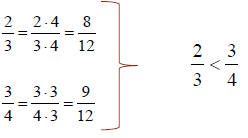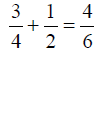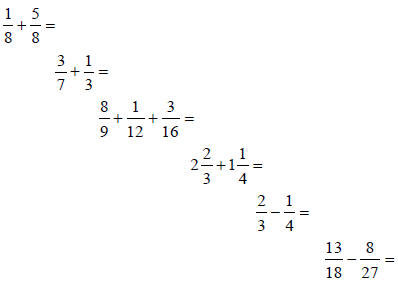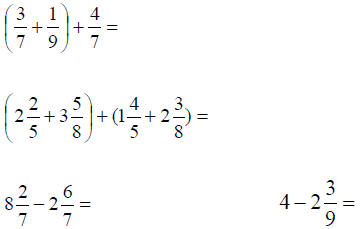Fractions II
Questions
• Are whole numbers fractions ?
• If Annie got 1/8 of a pie and Manny got 1/13 of a pie, who ate more pie?
▪ If Annie got 2/3 of a pie and Manny got 3/4 of a pie, who ate more pie?
▪ How can we compare fractions ? Are there some that are easier to compare?
Comparing fractions
▪ Convert fractions into equivalent ones that are easier to compare.
▪ OR
▪ Use your fraction sense .

But, I could also think about how far each of these is from 1!
Problem
▪ Arrange these fractions from smallest to largest without converting to equivalent fractions , decimals, drawing pictures . Use your fraction sense and reasoning tools:

▪ Is it possible to put a fraction between any two fractions on a number line?
▪ Why or why not?
▪ We say that the set of fractions is dense.
▪ Can you come up with a way of adding two fractions with equal denominators ? Give an example and show on a model why your method works .
▪ What about adding fractions with different denominators ?
Definition
▪
Let  be any two fractions. Then
be any two fractions. Then

Misconceptions
▪ Some students initially view the addition of fractions as adding the numerators and denominators as follows :


Using this example discuss why such method for addition is unreasonable.
Exercises:

Properties?
▪ What properties of whole number addition do you think fraction addition has?
▪ Closure?
▪ Commutativity?
▪ Associativity?
▪ Additive identity?

Definition
▪
Let  be any two fractions. Then
be any two fractions. Then

Mental math and properties of addition

Multiplication: a whole number times a fraction
▪ Use the repeated addition approach:

Multiplication: a fraction times a whole number
▪ Repeated addition doesn’t make sense for

▪ We can think of taking one third of 6.
Multiplication: a fraction times a fraction
▪ Use the new approach!
 is one fifth of
is one fifth of 
Picture

Take one fifth:

Definition
▪
For any two fractions  we define
we define

Question
▪ Is  Why or why not?
Why or why not?
Properties of multiplication
▪ All the properties of whole number multiplication and
▪ Multiplicative inverse property:
▪
For every nonzero fraction there is a unique fraction
there is a unique fraction
 such that
such that

Problem
▪ During one evening Kathleen devoted 2/5 of her time to mathematics, 3/20 of her time to Spanish, 1/3 of her time to biology and the remaining 35 minutes to English. How much time did she spend studying her Spanish?
| Prev | Next |